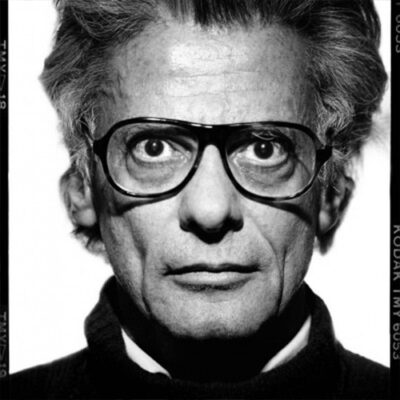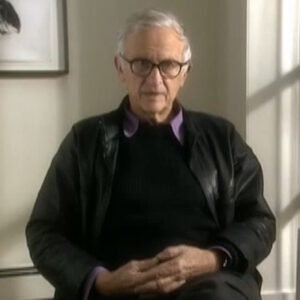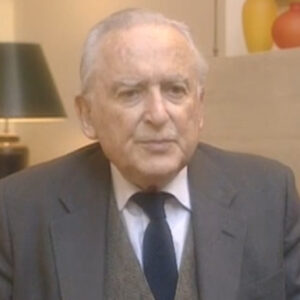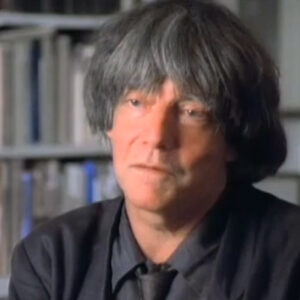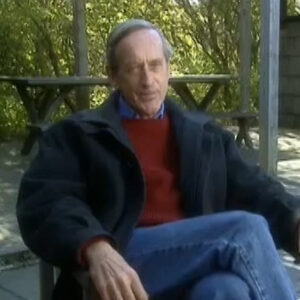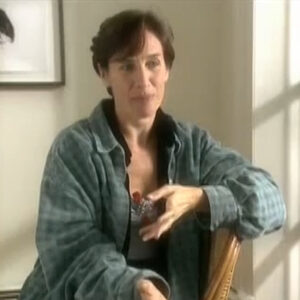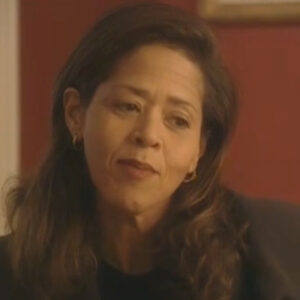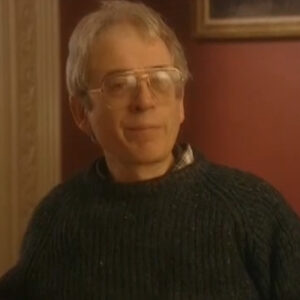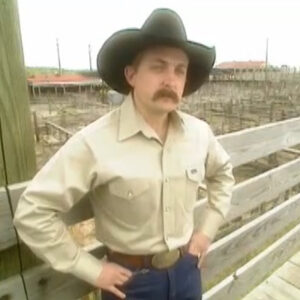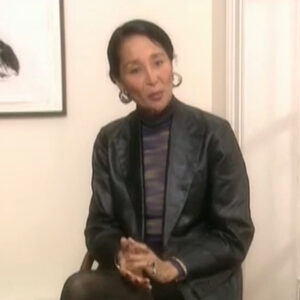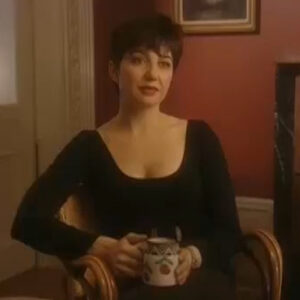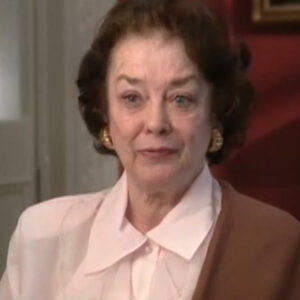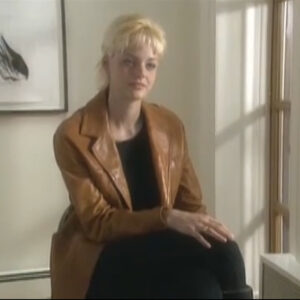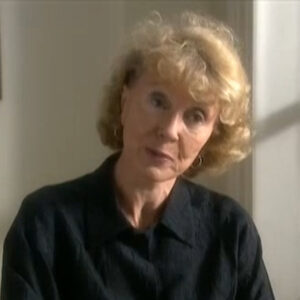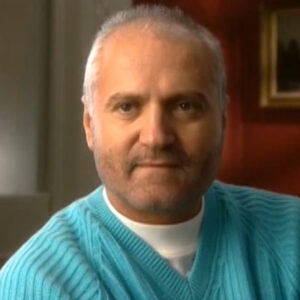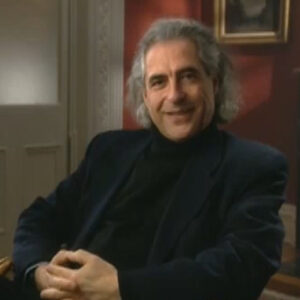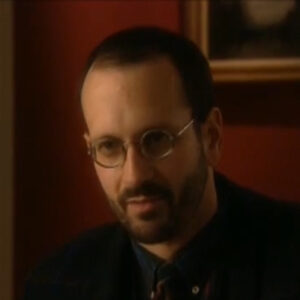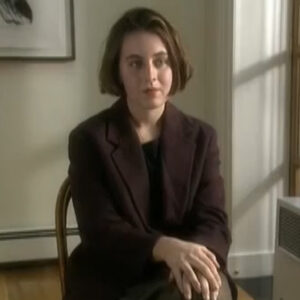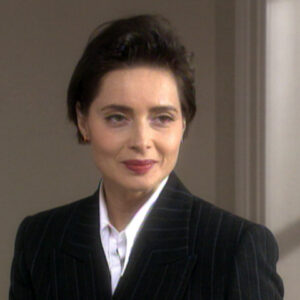Speaker I know I’m not a fashion photographer, I was in a class with Nan Goldin at ICP in New York and she said that I would take the class, that I could learn a lot from Dick, what her connection with Dick is, I have no idea.
Speaker So I applied in that way. I just dropped off a portfolio. And when I dropped off the portfolio, there were about somewhere between a hundred and two in our portfolios in the room. And I just figured that mine, which was rather naively put together, it was just, you know, a box of prints, not even good prints. I just thought, you know, I wouldn’t be hearing any more about it. And some of us, it turns out, were marginally accepted to this class. They were sort of interviewed. And so we had it. There were a few of us who had to come in for 50 minute interviews. We were told absolutely not to be late. We showed up at the studio and, you know, it’s like the first scene to walk into that studio. You know, you got to Vivian and the elephants. You’ve got the, you know, perfectly tasteful Bill Bockman and everyone sort of there’s a quiet hum of activity. And the great man was not to be seen. And they had me sit and they gave me water. And so there was all this sort of sense of anticipation. And I didn’t really know that much about evidence. You know, I didn’t because it wasn’t my field. I wasn’t there wasn’t it wasn’t so much the the aura of expectation didn’t hit me until I was in the room, you know, and there was this hum that the man’s hive. And finally he showed up and I was expecting this grand entrance by some sort of swooping figure and outcomes, this imp, you know, with this tremendous amount of energy. And it’s just not what you’re expecting. I don’t know what whether you knew Dick before you did this or so out he comes in here. You know, he’s got the big handshake. He’s very warm and he leads you back into the room and you’re in a huge studio space. And there’s two chairs right next to each other. And I’ve got he gets me a cup, got a cup of coffee from earlier, and he sits down practically in my lap and begins to talk. And there’s this tremendous sense of for me at least, of being a little too close, which I feel that he was very much in control of. And one of the first things he did was reach over and grab my coffee and just take a big swig out of it and put it back down. So already I sort of felt like, well, whatever whatever is happening now, it’s happening on his terms. You know, he’s seeing what I made of and I’m and and all it just sort of rattled me. So the rest of the questions were like, what do you think I should do with this class? And I thought he was messing with me because I thought, well, you’re Dick Cavett. You just show up. You don’t have to do anything. Any other photographer, you know, they bring slides and they bring books in. They don’t, but they don’t. You don’t feel like they’re tearing their hair out. So I had no idea that he had in mind what this has all become, which is he had in mind a tremendous invested, you know, in all of his time and energy and really trying to think of the best way to teach a class. And I had no idea what he should do. And and that was about the interest in my answer. You know, I think, as I probably told him, he should show up. And and then he told me that my generation watch too much television and that that I had better get a little more interesting and a little more confrontational or, uh, or I wasn’t going to be in the class, something like that. If I was gonna be in the class, I was sure as hell going to have to get more interesting. And then I again assumed that that would be the last I’d ever seen them.
Speaker But, uh. So that’s how that’s how I get in.
Speaker Has your work, if it has changed as a result of this. The goes to the heart of what kind of a teacher is David?
Speaker Well, it’s hard to it’s hard to underestimate the value of having someone show an interest in your work with a tremendous amount of judgment and discretion, and it’s a difference between you’re going home to an empty house and you’re going home to your wife or a loved one or whatever. And that person is going to be really interested in how your day was and helped you think about your day and how you know how you can make it better in the future. And it’s almost you know, it’s it’s, uh, it’s having the interest and having Dick’s interest is, uh, is an incredibly valuable thing to have because he spent his life looking at pictures. He comes from a tradition of looking at pictures. I mean, I feel like I’ve got image there in the background when I’m talking to Dick. And there’s no aspect of a career in photography that he doesn’t know about.
Speaker And so. What specifically do you work or not see? I want to see how do you feel pushed by pushing you, shaking you up in certain ways?
Speaker Well, originally, I think he saw something kind of funny in my in my work or something. A little a little offbeat. A little. And and that is what he’s always encouraged me to pursue. And at the same time, he’s been very good about. He doesn’t want me to just to be merely funny.
Speaker So that’s a high standard. And that is that is very much in the vein of where I saw myself going. But Dick is not so much pushing us to sound like he has some preconceived idea of where we should go and then he’s pushing us towards it. It’s more for me, at least he is. I just my energy level goes up around him. His energy level is so high and my desire to please him and please the class and show people and and, uh, you know, if he’s interested, you know, it’s interesting, basically.
Speaker So talk a little bit about what he said about that and what you would like to say could be a life’s journey through with his plane.
Speaker I mean, you want to cut it out?
Speaker Well, that’s a, uh, a good case in point, because that’s a photograph that we’re starting over.
Speaker Yeah, photographs. He concentrated on yesterday.
Speaker Well, that’s a good example, because that’s a photograph that I looked at and thought was interesting and potentially a departure point for me.
Speaker And it’s interesting that, you know, it’s Dick, because at the same in the same breath that he says this would be a great thing to pursue. He immediately seized the photograph, difficulty of it. You know, the next thing out of his mouth was you may not be able to get 10 of these in a year. You may shoot nothing like you may just go fishing for this. And this only and not get it. In other words, immediately he’s analyzed. Are you willing to pay the price? You know, is this.
Speaker And you know, it’s.
Speaker It’s difficult because what were his what you get from Digg is on so many different levels of of interest and it’s a lot of stuff that Dick doesn’t know is valuable because two decades second, it’s second nature. And to us, he just doesn’t know the kinds of things like today, watching him take a portrait of Andre, where he was talking about to Andre about mood and a story and stuff like that. And at the same time, he was pointing to his camera lens because he wanted Andre to look at the lens. And the main focus was on on on the mood. And that set of Andre, you know, what would create the expression that he wanted. And yet he had this technical thing that he needed to achieve. But it was secondary. And he was doing both of things at once. Well, if I were doing that, I would say, would you please look in in the lens? And then I’d go back. And, you know, it seems like a simple thing to point at the camera lens. But I never thought of that before. It’s not something I do. And to Dick, Dick would never think that he would that someone was learning something like that from the class. But you can’t. It’s hard to imagine the value of that, because when I when a good picture is taken and a portrait session, it comes from a mood. It’s usually a lot of pictures taken very fast at a particular moment. And the rest is just prep and drivel. You know, it’s just it’s just stuff on contact sheets sitting in your closet. And so not interrupting when you’re near that moment is a lot of the art of photography, and he’s tremendously good at that kind of thing.
Speaker Just keep on sitting. Discussion about. Tension between the great truth about what was said.
Speaker Well, I just think traditionally Dick takes the point of view that that photographer and the subject are collaborating on a fiction. And because his he’s not stealing photographs on the street. Like a lot of photographers, he or, you know, keep Jane court moments. He always sees it as a collaboration and he always sees himself as the final arbiter. And he often sees the portrait is ultimately more reflective of him in some ways than the subject. But I think he takes that point of view because the opposite point of view is the more conventional and is the more dominant. And it’s his point of view is the one that is less understood. But it’s very difficult to get him to cop to the fact that part of what we’re after when we’re taking pictures is a successful likeness of the person. And what we mean by that is something to do with what that person really is like. And, you know, they were up there talking about they don’t like the word truth. They don’t like to, but. And who would like such a highfalutin word, you know?
Speaker But why do it if you’re not a part of that?
Speaker Yes. I mean. What was his response to you? Just two pictures.
Speaker Well, I feel like I must have asked the question well enough because what was he? He digressed to the moral issue of whether you show something that might be reflective of the person in a in a Casselman and unflattering light. In other words, make in that case, he was a man who held his child upside down. The child was squalling. So the child, the father, in fact, looked like a, uh, you know, an abusive father. And he didn’t want to create that impression. But that wasn’t what I was talking about. And he also talked about the aesthetic question. He has a picture of Coco Chanel with her neck is extended. And it’s not a flattering picture of someone who’s in the latter stages of their lives. And and Dick is very courageous about showing those kinds of pictures. And I really think it’s true that he doesn’t. He thinks about it, I’m sure. But I think he thinks the photographs are more important than whether they think they were cosmetically pretty. But that, again, wasn’t what I was trying to isolate. What we were talking about is whether some concessions have to be made or whether our aesthetic judgment is skewed by the fact that we’re trying to get at what the person is really about and whether are pictures. Are more like what they’re really about. And I don’t know, maybe I just don’t. I always feel like he must be at some level out for that himself. You know, I think a picture like Chaplin with the horns or whatever, I think that he sees that in some ways is a summing up of of Charlie Chaplin.
Speaker I mean, that’s what part of what makes it such an evocative picture.
Speaker But he would just probably disavow the truth. I think he’s just trying to make people look at photographs as in a more interesting way. There’s a more complicated way, because there’s certainly plenty of people out there who are telling us with a very serious tone of voice that they’re out for truth and justice and the American way. And we don’t need we don’t need anymore.
Speaker He’s driving his class and making this experience for all of us. It’s come up in all his friends. It can be exhausting to love him turning ordinary moments into something extraordinary, just listing them, charging them with a drama or tension or whatnot. Do you feel class about that?
Speaker Well, the man has star quality. I mean, let’s face it, whatever that is, whatever we recognize it in our movie stars or whatever. I feel the energy level, the room rises when Dick is around. I gravitate towards him at parties.
Speaker I’m interested in what he has to say. I don’t care if he’s talking about the orders. He’s a wonderful storyteller. So.
Speaker And the amount of time and energy he invests into thinking out all the different angles, what the food’s like, what the people are like, how people comport themselves in order to make everything magic, what the music’s like. Is it incredible? And then once it is going, he forgets it. He it is not evident that he’s thinking about any of those things. Once the thing is happening, he is with the moment. He may be recognizing that the music isn’t quite right.
Speaker But you if he is, you cannot see it. And that’s an incredible gift. And it shows in the pictures because that is what you need. You need people to concentrate on the focus. And I thought you could see it even in, you know, what is to some degree an artificial situation where he’s being filmed taking a portrait.
Speaker I thought you could see that he was creating a very focused moment and something kind of special out of a very chaotic kind of situation.
Speaker And I don’t know how he does. I mean, he really is an incredible thing.
Speaker And that is not a very useful thing for us to learn from. In a way, because it’s a quality personality.
Speaker So we have to I you know, the other people here, we have to find some other way because we’re not going to we can’t do it Dick’s way. The last thing.
Speaker I think when asked why is he doing this at this point in his career over 40 years and why is he teaching, you talked about his need to give back at this point what he’d gotten from brought addiction. And at this point, it’s not just the desire to give back and pass things on. Can you talk a little about that? Why you think at this point he’s teaching with such passion?
Speaker Well, he does have a book contract, but let’s. Yes, but aside from that, I think it’s a natural response that he just had the major retrospective of what is likely to be a retrospective release, a major book, which is called An Autobiography. It is his life’s work. The man has many more books in him. He has a lot more work. But I think he is thinking about what he’s done and whether anyone else could benefit from it and and interested in teaching other people and creating a launching ground for other people. Mm hmm.
Speaker It gives us the guts to put up you brought up your connection to God.
Speaker Yeah, well, I don’t know. I actually don’t know that much about that relationship, you know. And he seems like everyone who talks about brought up, which had a very complicated relationship with him. And probably if you explored, as you are, Dick’s relationship with all of us, you get some fairly complicated answers as well. He’s not a simple man. So I don’t know what’s filtering to us from that. You know, whether he learned from proud of it. A very complicated way of teaching and being with students that maybe he’s probably dating or whether it’s his own thing, I don’t know.
Speaker My teacher.
Speaker But he always wanted to please him. And there is you can see it in our class. There’s a desire to, you know, if Avidan is interested, that it’s interest or at least that it has some it has impact, has surface impact.
Speaker And, uh, and that’s I mean, he always rather or not, that he ever got praise. He always wanted to impress Breivik.
Speaker He probably could not exactly tell you what what it was about. And, uh, and I don’t think I could exactly tell you why.

